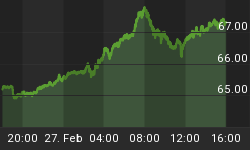China's bubbling tech sector has been hit with a massive regulatory storm ever since Alibaba Group Holdings (NYSE:BABA) founder Jack Ma criticized his country's government last year for what he called excessive regulations. Beijing hit back by cancelling the much-anticipated IPO of Ma's Ant Group--the world’s largest fintech--before putting the company through a "rectification" process and announcing it would henceforth "prevent the disorderly expansion of capital."
Well, it turns out that Beijing authorities were not bluffing, if ongoing developments are any indication.
Over the past few months, sweeping crackdowns across diverse sectors of the Chinese economy have been sending shockwaves across global financial markets, with American investors finding themselves in the firing line of some of the hottest sectors.
First off, Beijing cracked down on the crypto space, curbing bitcoin mining due to concerns of excess speculation and warning financial institutions against offering crypto services.
Regulators then turned their sights on Chinese ride-hailing giant Didi Global Inc. (NYSE:DIDI) for alleged data security violations before China's antitrust administrator ordered Tencent Music Entertainment (NYSE:TME)) to give its exclusive music licensing rights for online music.
And now Beijing has cracked the whip over China’s expansive online gaming sector.
On Tuesday, American depositary receipts of Tencent Holdings (OTCPK:TCEHY) and XD Inc.(OTCPK:XDNCF) fell 7.3% and 5.3%, respectively, while those by their U.S. videogame peers Activision Blizzard (NASDAQ:ATVI), Electronic Arts (NASDAQ:EA) and Take-Two Interactive Software (NASDAQ:TTWO) plunged 4.6%, 3.9% and 9.6%, respectively, after a publication controlled by the Chinese government described online games as “spiritual opium” and ‘‘electronic drugs'’according to multiple reports.
The American video game makers have been caught in the crossfire due to fears about their high exposure to the Chinese market.
Activision has significant exposure to the Middle Kingdom through its Call of Duty franchise; EA’s latest SEC filing shows that $3.2 billion of its overall fiscal 2021 revenue of $5.6 billion was from international sources while 39% of Take-Two total $813.4 million during the last quarter was from international markets.
A Passive-Aggressive Beijing
During the previous wave of crackdowns, regulatory moves aimed at the pivotal technology, property and education sectors have triggered heavy selling in Chinese markets and cast a dark cloud of uncertainty about stocks from the Middle Kingdom.
Shares of some of the most recognizable Chinese names such as Tencent (OTCPK:TCEHY) and Meituan (OTCPK:MPNGY), as well lesser known names such as TAL Education (NYSE:TAL), New Oriental (NYSE:EDU), and Gaotu Techedu (NYSE:GOTU), have tanked in double figures in a matter of days due to the said crackdowns. In fact, the Nasdaq Golden Dragon China Index (NASDAQ:PGJ) - which tracks 98 of China's largest firms listed in the U.S.-- plunged 8.5% on Friday and another 7% on Monday, marking the biggest two-day selloff since the 2008 global crash. The major indices have not been spared, with the Hang Seng down 5.4% and Shanghai Composite Index falling 2.5% on Monday trading.
However, most of these stocks went on to recover after Beijing appeared to beat a hasty retreat with several Chinese state-owned publications shortly urging calm assuring investors the selloff would not last.
And now a similar pattern is being observed with the videogame fiasco.
Tencent ADRs were up 4.1% while Netease Inc. (NASDAQ:NTES) eased 2.3% on Wednesday’s session after Tuesday’s tumbles following some reports today that Beijing has softened its stance on video games.
According to a Bloomberg report.China's People's Daily has published an editorial in an overseas edition that has stressed the need for government, schools and society to promote better protection for excessive gaming. The editorial employs a very different and conciliatory tone compared to an article published yesterday in the Economic Information Daily that compared video games to "spiritual opium."
The Economic Information Daily editorial was also later deleted and softened.
The original Economic Information report sent shockwaves across the videogame arena with Tencent going on to forbid in-game purchases for kids under the age of 12 and pledging to impose limits on gaming time.
It’s doubtful whether Beijing’s latest mea culpa will be enough to undo the damage on the sector.
KraneShares CSI China Internet ETF (KWEB) is down 25.8% over the past 30 days and is -35.4% in the year-to-date while the iShares MSCI China ETF (NASDAQ:MCHI) and the Invesco Golden Dragon China Portfolio ETF (NASDAQ:PGJ) have lost 11.9% and 26.0%, respectively, so far this year.
















